“After paying all my debts, I do not have enough to buy rice for this month. My potatoes cannot be sold, and I do not know what to do,” Nang Kham told SHAN with her confusing voice.
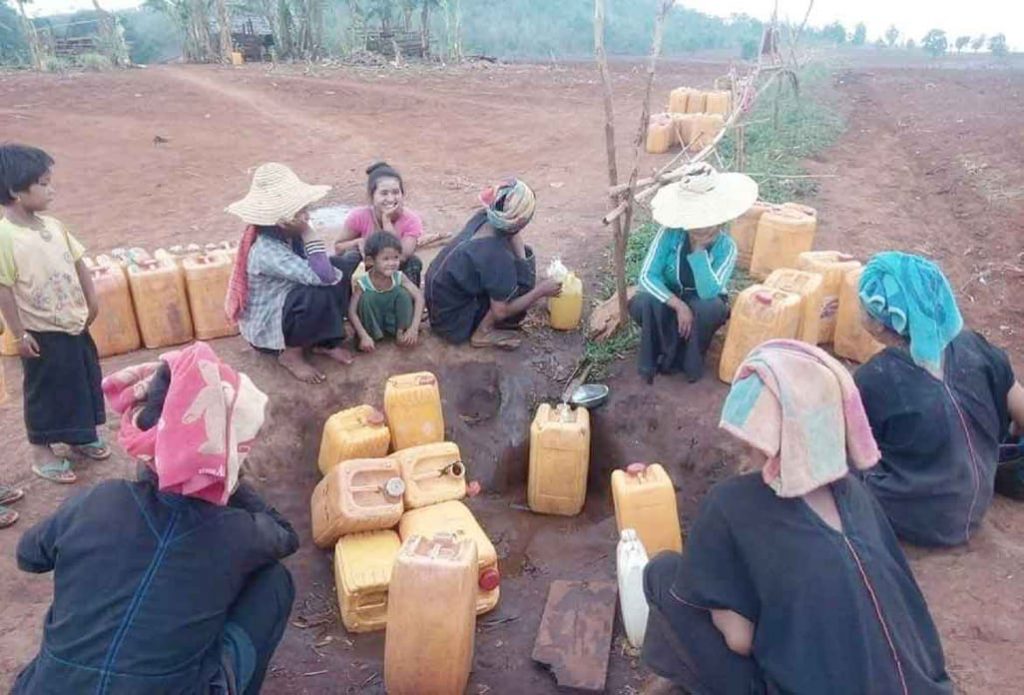
Nang Kham is a woman farmer who is living in a small village in Nong Jaw tract, Hsi Hseng township, Southern Shan State.
The village is located southeast of Taunggyi city, Hsi Hseng township and the majority residents are Pa-O, Shan, and Kayan tribes, and other ethnicities are also living there.
The main source of income is from agriculture, and most people are farmers and their crops are mostly sold in the city like Taunggyi.
Due to the political instability and Covid-19 pandemic, Nang Kham’s family can no longer sell their crops in the city, and they have been struggling to make day to day ends meet.
A farmer like Nang Kham has faced many troubles such as inadequate income to cover the family expenses because there is no demand for the crops during this crisis.
“I grow potatoes. In the past, I went to sell my produce in Aung Pan, Kalaw, and Taunngyi. Because of the current Covid-19, I cannot go anymore. Also, the price is not good,” Nang Kham disappointedly told SHAN.
Nang Kham has two daughters, one has gone to Thailand to find a better job, and another is living with her in Hsi Hseng township.
In the past, her elder daughter who is working in Thailand would send home 200,000 Kyat monthly. With that she could pay off her debt easily.
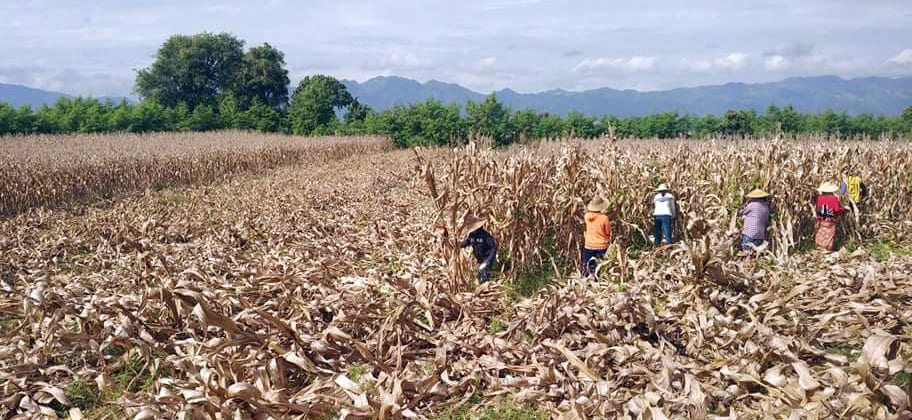
However, her daughter cannot send money back like in the past because of Covid-19 pandemic in Thailand. So, Nang Kham is struggling very hard for the day to day expenses and for paying back her monthly debt.
“I borrowed some money to send my two brother and sister to Thailand. However, I could not pay back the debt, and the creditor came and took all the materials I collected to build my house,” Sai Naw, Hsi Hseng resident also explained his situation to SHAN.
Nang Kham also borrowed 2.5 million Kyat in order to fulfill her day to day expenses. She is now struggling to pay back the debt which is 250,000 Kyat per month.
“For our food, we can still eat those from our farms. But it is very hard to earn 250,000 Kyat to pay back the monthly debt,” Nang Kham added.
Three years ago, the micro finance services established in Hsi Hseng township and started lending money to farmers.
“Our agriculture business is not good this year, we can barely cover the transportation cost. There is also no job in the city even if we want to work alternatively. With the debt we have here, the future looks very difficult,” a 33-year old Khun Myint, who lives in Nong Jaw track, Hsi Hseng township, told SHAN.
Even though the micro finance services were very useful in the past to expand our businesses, it is very hard to manage it these days according to Khun Myint.
A staff from a micro finance company in Southern Shan State told SHAN that farmers can skip their monthly repayment for two consecutive months, and if they do not pay on the third month, the company has no choice but to file a lawsuit against the farmers.
Even though farmers can repay their monthly debt in the past, it has been very hard nowadays to meet the deadlines. This has caused problems between the farmers and the creditors.
“If we miss the deadline, the company staff will come to our home. It cannot be late, and I am also afraid that I will be sued. The company should understand us during this difficult time,” Nang Kham expressed her view to SHAN.
Long Covid-19 pandemic crisis, military coup, and the high inflation are the main caused for the farmers like Nang Kham and other Nong Jaw residents who are unable to pay back their debt.
The micro finance companies only stopped collecting money in February and March 2021. After that, the company has been forcing those who missed the deadlines to repay their debt according to some residents.
Currently, a micro finance company has sued three farmers who are unable to repay their debt. Because of the lawsuit, those three farmers do not dare to live in the village, and they are on the run now.
Transportation cost has gone up a lot after the Covid-19 pandemic, and the crops from Hsi Hseng can no longer be transported to other regions to sell.
That is the reason farmers faced financial difficulties, and they cannot get out of their debt.
“Since Covid-19 started, some transportations have been suspended, and the cost also has gone up a lot. We cannot go and sell our crops in the cities. It started with Covid-19, and now the political crisis, we will not be free from our debt anytime soon,” a Pa-O youth farmer told SHAN.
A Pa-O youth pointed out that the primary objective of the micro finance services is to help the farmers and villagers to expand their business; however, these companies have been forcing the farmers and villagers to repay their debt which causes a big burden to them.
A staff from one of the micro finance companies said that they have to follow the instruction from their supervisor,” We cannot do anything even if we feel bad. We have to act according to our supervisor instructions,” quoted by that staff.
Hsi Hseng farmers have collectively requested the companies to temporarily suspending the collection during this difficult time because farmers cannot sell their crops, and they do not have other alternative incomes.
The interest rate in Hsi Hseng township is from 2 percent up to 20 percent. The rate from the Myanmar Agricultural Development Bank (MADB) and Co-operatives is 2 percent, and the outside rate is from 5 percent up to 20 percent.
“If we borrowed from MADB, we have to provide Form (7) of our land as a collateral. We can borrow 1.5 Laks for per acre of land, and we can borrow for up to 10 acres of land. But at the Co-operative, only members can borrow,” a farmer Sai Kham told SHAN.
“Farmers should try growing other demanding crops instead of the usual ones. They should try kidney bean or lentil. So, we can provide the technical support, and at the same time we can also help looking for the market,” a staff from Farmers Development Network (FDN) Sai Pon Han told SHAN.
Kidney bean can be grown almost anywhere, and it is easy to harvest, and it can be stored for a longer period of time. One acre of land can produce around 1,300 kilograms (800 Viss), and 1 Viss (about 1.6 kilo) can be sold at least 2,000 Kyat according to Sai Pon Han.
However, Nang Kham will be drown in her debt and the increasing interest days after days, and her future is very dark. The current crop cannot be sold because of the political and Covid-19 crisis; meanwhile, her daughter who is working in Thailand will not be able to send money home as usual.





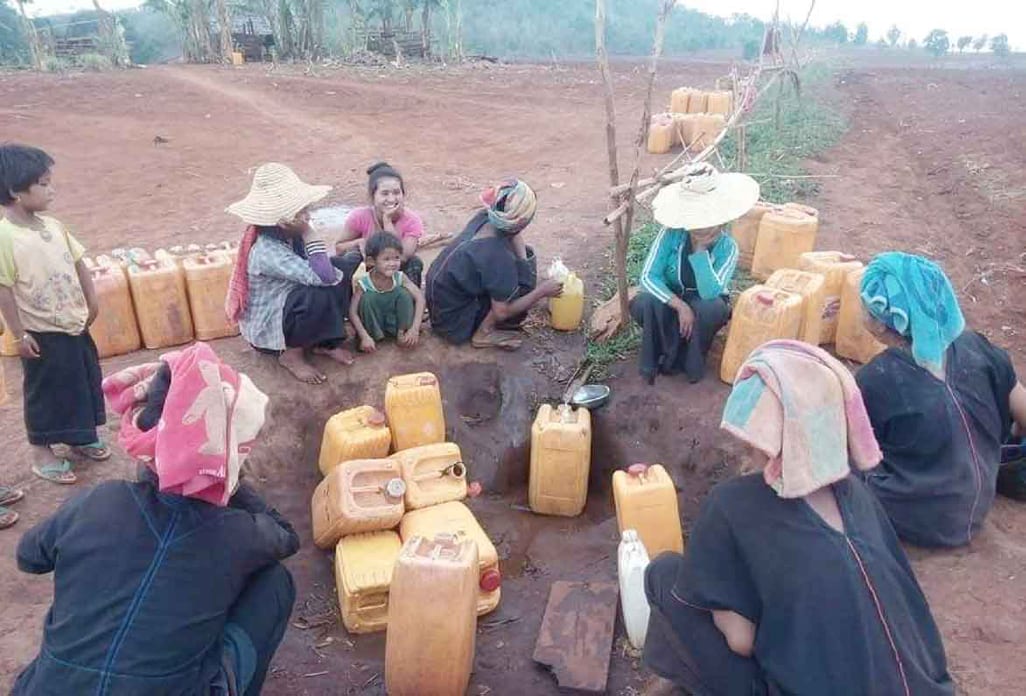

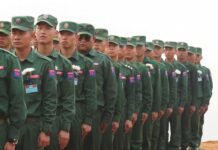
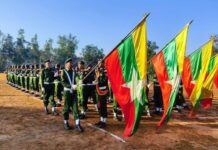

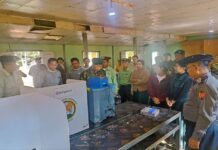






Leave a Comments